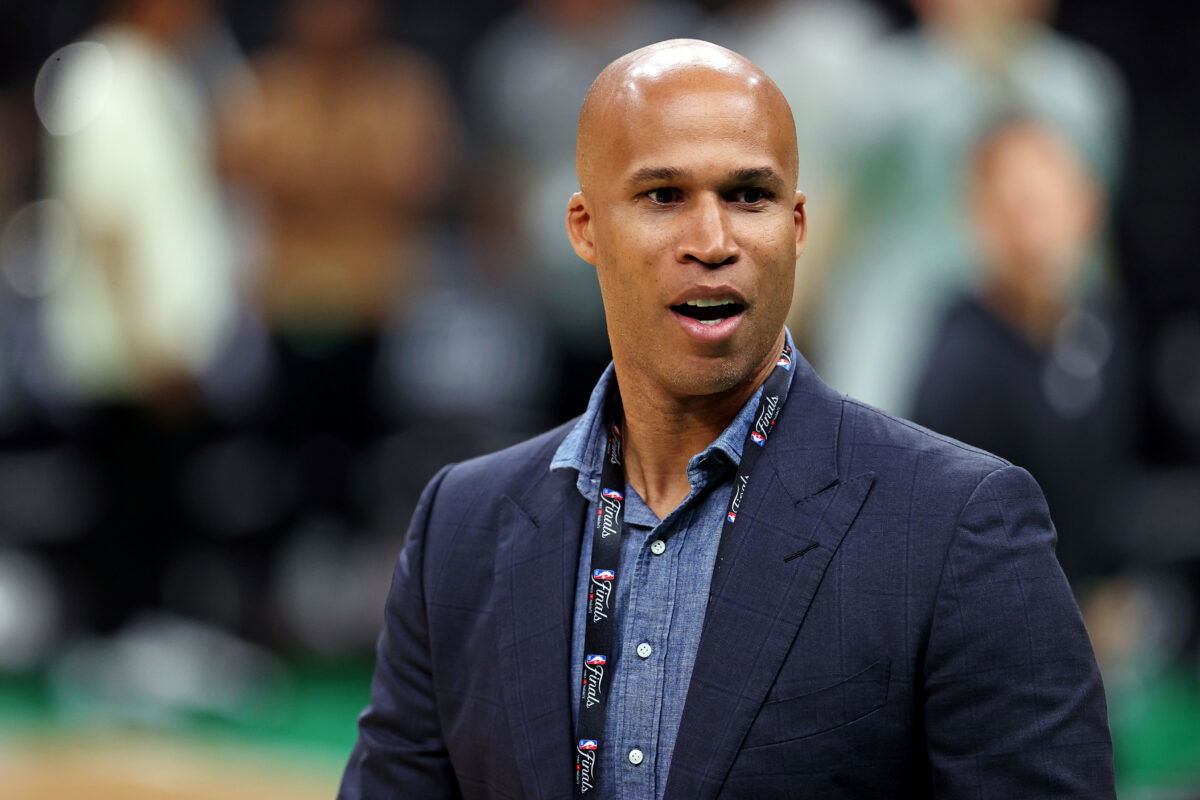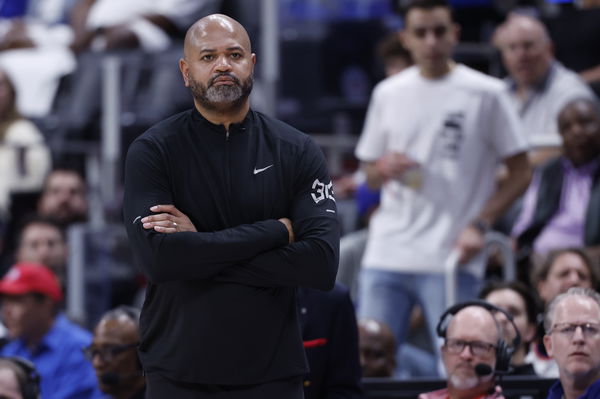
Imago
Jun 5, 2024; Boston, MA, USA; TV analyst and former player Richard Jefferson during the NBA Finals Media Day at TD Garden. Mandatory Credit: Peter Casey-USA TODAY Sports

Imago
Jun 5, 2024; Boston, MA, USA; TV analyst and former player Richard Jefferson during the NBA Finals Media Day at TD Garden. Mandatory Credit: Peter Casey-USA TODAY Sports

Imago
Jun 5, 2024; Boston, MA, USA; TV analyst and former player Richard Jefferson during the NBA Finals Media Day at TD Garden. Mandatory Credit: Peter Casey-USA TODAY Sports

Imago
Jun 5, 2024; Boston, MA, USA; TV analyst and former player Richard Jefferson during the NBA Finals Media Day at TD Garden. Mandatory Credit: Peter Casey-USA TODAY Sports
Referee under the radar? For fans, understandable, but it’s not often that former players scrutinize referees under the microscope with such precision. But when they do, you know something major went down. The 2025 NBA Playoffs have delivered their fair share of put-you-on-the-edge drama. But not all the conversation has been about the players on the court. This time, it’s about the men in gray stripes who are facing criticism for what could be one of the biggest officiating mistakes of the 2025 postseason.
Watch What’s Trending Now!
During a recent episode of the Road Trippin’ podcast, former NBA champion and now-analyst for ESPN Richard Jefferson didn’t hold back. Sitting down with the hosts, Jefferson broke down a controversial moment from Game 4 of the playoff series between the Detroit Pistons and the New York Knicks. And it wasn’t just the usual armchair commentary, one could tell this one hit a nerve. Richard Jefferson walked listeners through the mechanics of a missed call that might have shifted the balance of the entire series.
The play in question? A missed foul from Josh Hart while the Pistons’ Hardaway Jr. was attempting a crucial three-point shot. “Referees are trained to look down at the feet to make sure that it’s a three-point shot,” Jefferson explained. “When they realize that a player’s feet are behind the three, they raise their hand… After they look down at the three, they look up at the wrist. Wrist, hand. This is where most of the contact occurs.”
The analyst then quickly emphasized the challenge refs face when they have to scan from feet to arms and back to feet again to avoid missing a potential foul. “So they go feet, arm, feet. That means that they could be in a position where they’re not seeing contact through this portion of the body,” Jefferson pointed out. “And players are always going to flail… they’re going to kick out their legs.”
But then Richard told how it was not something intentional coming from the referees. “So if you look at where the referee was, he was directly to the other side. So when Josh Hart could have looked like it was a flyby, could have looked like there was contact, right? But we know there was a tremendous amount of contact. But that’s how the referees can be in a position to miss that.” The fact that it was unintentional, and the referee’s bad positioning at a bad angle at the worst possible time of the game, is a mix of luck and human error, might console the officials. But wait, decisions made in these situations give you a chance to choose which side of history you fall.
View this post on Instagram
What made Richard Jefferson’s analysis stand out wasn’t just the breakdown of how the call was missed; it was the weight he placed on that specific moment. “That was the single biggest possession and missed call of the entire series,” he declared. “That’s the difference between a tie game, a 50/50 series, and being down 3-1 with just a 17% chance to come back.” You could feel the frustration in his voice. And honestly? He has a point. Momentum is everything in the playoffs. One call – one moment – can change everything. And when you are expected to rise above the average days, you should. Without ifs and buts.
This leads us to the bigger picture: the Pistons vs. Knicks series has been an all-out brawl. There have been some incredible performances, clutch plays, and yes! Some head-scratching officiating. After the controversial Game 4, the officials came forward post-match to talk about the matter, where they accepted their mistakes. You just heard that right!
Richard Jefferson is right as always
As it turns out, Richard Jefferson wasn’t just speaking vaguely; the officials themselves backed him up. Crew chief David Guthrie admitted post-game that Josh Hart did indeed foul Tim Hardaway Jr. “After postgame review, we observed that Hart makes body contact that is more than marginal,” Guthrie said. “A foul should have been called.” It was a stunning admission that confirmed what Pistons fans and players had claimed from the moment the final buzzer sounded.
Tim Hardaway Jr., visibly frustrated after the game, kept his reaction blunt and direct: “You all saw it. It was blatant.” His coach, J. B. Bickerstaff, Pistons’ coach, was even more frustrated. He stormed toward the referees to plead his case as the Knicks celebrated their win. And Josh Hart? He didn’t deny anything. “Did I make contact with him? Yeah,” Hart admitted. “Was it legal? I don’t know. We’ll see in the Last Two Minute Report.”
But by the time the pool report and eventual review came out, it was too late. The game was over, the Pistons were down 3-1. The Knicks had stolen a game that many believe they shouldn’t have. Instead of facing a 2-2 series tied tightly with momentum swinging, Detroit is now on the brink of elimination.

Imago
Apr 24, 2025; Detroit, Michigan, USA; Detroit Pistons head coach J.B. Bickerstaff looks on in the second half against the New York Knicks during game three of first round for the 2024 NBA Playoffs at Little Caesars Arena. Mandatory Credit: Rick Osentoski-Imagn Images
That kind of officiating mistake is rare but not unheard of. It’s exactly why so many pundits, including Jefferson, are calling for improvements in how refs monitor clutch moments in games. The process Richard Jefferson described was detailed, methodical, and insightful, but it also exposed just how easy it can be to miss the most important call of a series. When human judgment is involved, there’s always room for error… but this one might haunt the Pistons all summer long.
So, what now? Can Detroit bounce back, or is this the moment that will be remembered as the one that robbed their fate? Either way, one thing’s for sure — the referees won’t be escaping the spotlight from now on.

